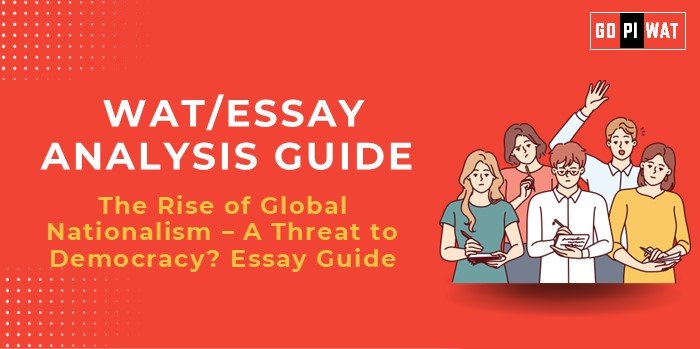📋 Comprehensive Analysis Guide: “The Rise of Global Nationalism – A Threat to Democracy?”
🌐 Introduction to “The Rise of Global Nationalism – A Threat to Democracy?”
In the 21st century, the resurgence of nationalism across various nations is reshaping political landscapes, often at odds with the principles of liberal democracy. This rise has implications not only for governance but also for global peace, cooperation, and citizens’ rights.
📖 Topic Background
Nationalism, rooted in identity politics and cultural pride, has often driven political movements throughout history. From economic inequality to migration crises, factors have fueled nationalist sentiments in countries like the US, India, the UK (Brexit), Hungary, and Turkey. Critics argue it challenges democratic norms, while supporters see it as reclaiming sovereignty.
📊 Quick Facts and Key Statistics
- 📉 Global Democratic Decline: According to the International Institute for Democracy and Electoral Assistance (IDEA), nearly 47% of countries have experienced a decline in democratic indicators over the past five years, marking the eighth consecutive year of global democratic backsliding.
- 📈 Rise of Populist Leaders: In recent years, several countries have elected leaders with nationalist agendas, including the United States, Brazil, Hungary, and India, reflecting a global trend toward populism.
- 📊 Public Dissatisfaction: A Pew Research Center survey indicates that many citizens feel politicians do not care about their perspectives, highlighting democracy’s complexity and challenges.
- 🇬🇧 Brexit Vote (2016): 52% of the UK voted to leave the EU, illustrating nationalist sentiments against regional integration.
- 🇮🇳 India’s Nationalist Agenda: Policies such as the Citizenship Amendment Act reflect the intertwining of nationalism and governance.
🎭 Stakeholders and Their Roles
- 🗳️ Governments: Often promote nationalist agendas for political gains, emphasizing sovereignty and security.
- 👥 Citizens and Civil Society: Support or oppose nationalism, affecting public discourse and policy.
- 📰 Media: Influences narratives around nationalism, amplifying either unifying or divisive rhetoric.
- 🌍 International Bodies (e.g., UN, EU): Promote democratic norms and counterbalance nationalism’s excesses but face backlash.
- 📚 Academia and Experts: Analyze and critique nationalism’s effects on democracy and propose solutions.
🏆 Achievements and ⚠️ Challenges
✨ Achievements
- 🇳🇺 National Identity and Cohesion: Nationalism can unify citizens around shared values and history.
- 🔒 Policy Sovereignty: Countries often regain control over domestic issues (e.g., Brexit’s emphasis on self-determination).
- 💸 Economic Benefits: Protectionist policies under nationalist agendas can strengthen local industries.
⚠️ Challenges
- ⚖️ Erosion of Democratic Norms: Nationalist leaders may centralize power, undermining institutions and checks and balances.
- 🧩 Xenophobia and Polarization: Increased discrimination against minority groups and migrants.
- 🌐 International Isolation: Reduced global cooperation and strained international relations.
🌍 Global Comparisons
The rise of leaders like Viktor Orbán in Hungary showcases “illiberal democracy,” contrasting with Canada’s multiculturalism model.
📚 Case Studies
- 🇮🇳 India’s Policies on Citizenship and Religion: Illustrates nationalism’s impact on minority rights.
- 🇭🇺 Hungary’s Media Repression: Reflects a broader trend of stifling dissent.
- 🇺🇸 United States: The rise of populism has led to increased political polarization and challenges to democratic norms.
- 🇧🇷 Brazil: Under President Jair Bolsonaro, Brazil has seen a rise in nationalist rhetoric, impacting environmental policies and indigenous rights.
🗣️ Structured Arguments for Discussion
Supporting Stance: “Nationalism revitalizes national pride, protects borders, and empowers marginalized voices who feel betrayed by globalism.”
Opposing Stance: “The rise of nationalism poses a threat to democratic institutions, leading to the erosion of civil liberties and the undermining of checks and balances.”
Balanced Perspective: “While nationalism promotes sovereignty and pride, unchecked, it risks eroding democratic checks and fostering xenophobia.”
🔑 Effective Discussion Approaches
- 📊 Statistical Approach: “According to the International Institute for Democracy and Electoral Assistance, nearly 47% of countries have experienced a decline in democratic indicators over the past five years, coinciding with the rise of nationalist movements.”
- 📜 Historical Context: “Historically, surges in nationalism have often preceded periods of democratic decline, as seen in early 20th-century Europe.”
- ⚖️ Contrast Approach: “While nationalism can unify a nation, it often does so at the expense of democratic principles, leading to a complex interplay between national pride and governance.”
🔄 Counter-Argument Handling
Acknowledge the legitimate concerns that fuel nationalism, such as economic inequality and cultural identity, while emphasizing the importance of upholding democratic institutions and protecting minority rights.
📈 Strategic Analysis of Strengths and Weaknesses
Strengths: National pride, policy sovereignty, social cohesion.
Weaknesses: Undermines democratic norms, promotes exclusion, polarizes societies.
Opportunities: Greater local governance, economic nationalism.
Threats: Authoritarian drift, global isolation, societal fragmentation.
🎓 Connecting with B-School Applications
Real-World Applications: Connect to marketing themes using nationalism in branding, managing political risk in global business strategies.
Sample Interview Questions:
- 🌐 “Can nationalism and globalization coexist within democratic structures?”
- ⚖️ “How should leaders balance national pride with global responsibilities?”
Insights for B-School Students: Explore leadership ethics in politics, and research business risks in nationalist-driven policies.


